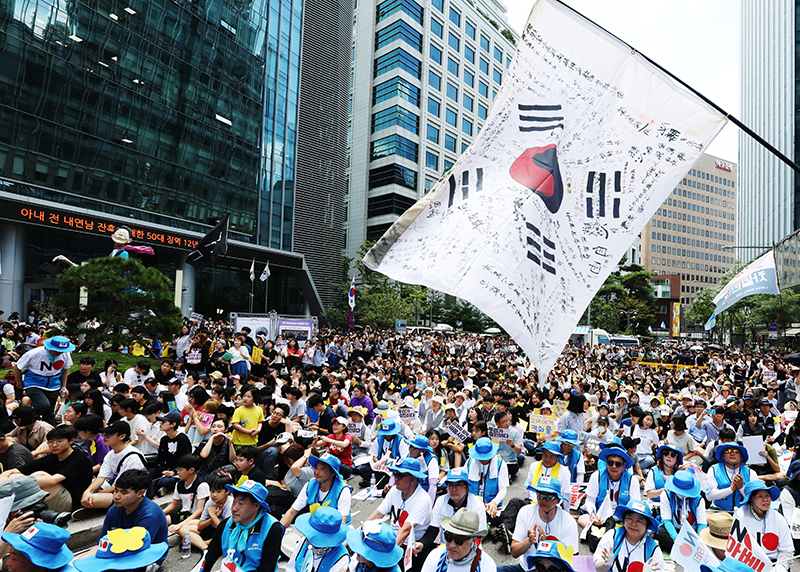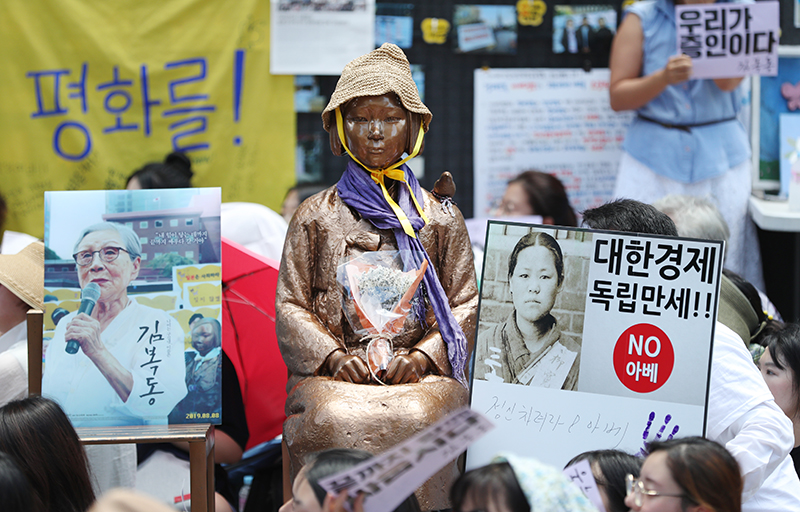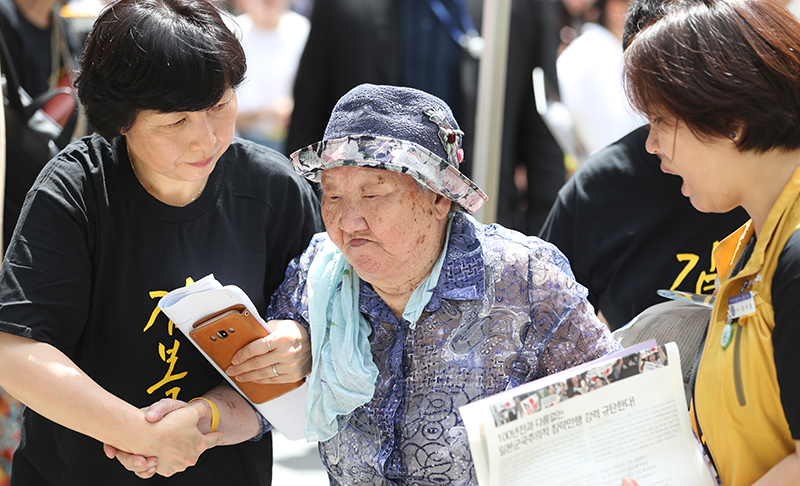
The day before Korea's 74th National Liberation Day, thousands of people on Aug. 14 gather in front of the former site of the Japanese Embassy in Seoul. This rally marked its 1,400th straight week to demand Japan's apology for sexual enslavement of Korean women before and during World War II.
By Lee Kyoung Mi and Kim Minji
Photos = Kim Sunjoo
Seoul ㅣ Aug. 14, 2019
"The Japanese government should deliver a formal apology to comfort women victims!"
Thousands of people on Aug. 14, the day before National Liberation Day, gathered in front of the former site of the Japanese Embassy in Seoul despite the scorching sun to demand an apology from Japan for its sexual enslavement of Korean women before and during World War II.
The weekly Wednesday protest demanding Japan's apology for the so-called comfort women began on Jan. 8, 1992, and marked its 1,400th straight week on Aug. 14.
This week's demonstration commemorated the seventh annual International Memorial Day for Comfort Women held in 21 cities in nine countries such as Japan, the U.K., Australia, New Zealand and Taiwan. The Korean Council for Justice and Remembrance estimated nearly 20,000 people gathered and shouted "The world together shouts 'With you!' once again as the victims shout 'Me Too!' Japan must pay attention to the victims' voices!"
Given the protest's heightened significance amid Korea's worsening trade spat with Japan, foreign media gave extensive coverage to the event including TBS and TV Asahi of Japan.

The weekly Wednesday demonstration to demand Japan's apology for its sexual enslavement before and during World War II on Aug. 14 marked its 1,400 straight week. Protesters hold signs near the "Statue of Peace" in front of the former site of the Japanese Embassy in Seoul.
Gil Won-ok, a surviving comfort woman, said, "Thank you for coming in the sweltering heat," adding, "Victory will come after we fight until the end and win."
North Korea also sent a message to the demonstration, saying, "Japan has still not atoned for its past sins even today."
It added, "The entire nation must fight and get compensated for what Japan did in the past," saying both Koreas could combine their efforts to stand up to Japan.
Under the sizzling heat, the demonstrators held picket signs with messages like "Remember and apologize" and "Cheer up, grandma! We'll never forget."
Kim Hyun-ju, who attended the demonstration with her children, said, "It's very difficult to explain comfort women to children," adding, "But they're a crucial part of history that (children) should know. So I thought it was important for them to visit the site and experience it."
Kyoko Ono, a Japanese woman who sat in the first row at the meeting place from the beginning until the end, said she has attended the rally since 2005. "I attended an International Memorial Day for Comfort Women event called 'Connecting Batons of Hope,'" she said.
"I'll participate in the 1,500th and 1,600th demonstrations until the sexual enslavement issue is resolved." The rally is the longest in world history for a demonstration held for a single cause. It began after Kim Hak-soon became the first Korean comfort woman to make her story public on and has continued for 29 years.
In 2011, the protest marked its 1,000th week and the "Statue of Peace" was installed at the former site of the Japanese Embassy in Seoul. In December 2012, a solidarity conference held in Taiwan designated Aug. 14 as International Memorial Day of Comfort Women.

Gil Won-ok, a surviving comfort woman, on Aug. 14 participates in the weekly Wednesday protest to demand Japan's apology for the sexual enslavement issue in front of the former compound of the Japanese Embassy in Seoul.
km137426@korea.kr